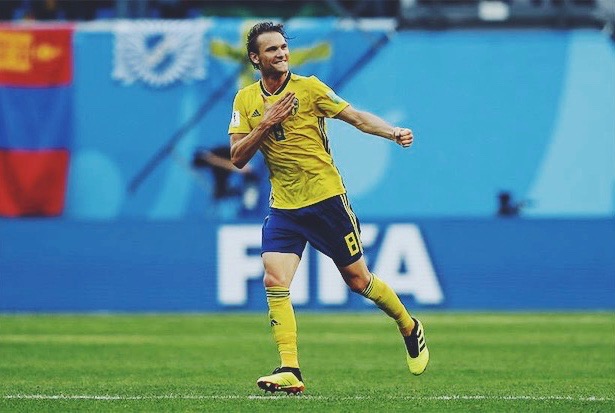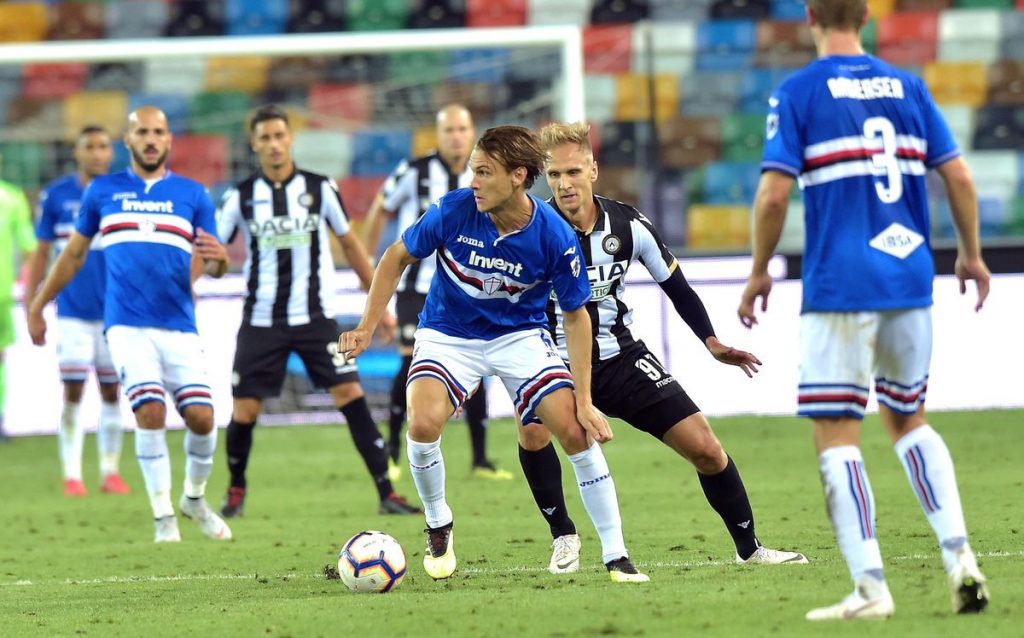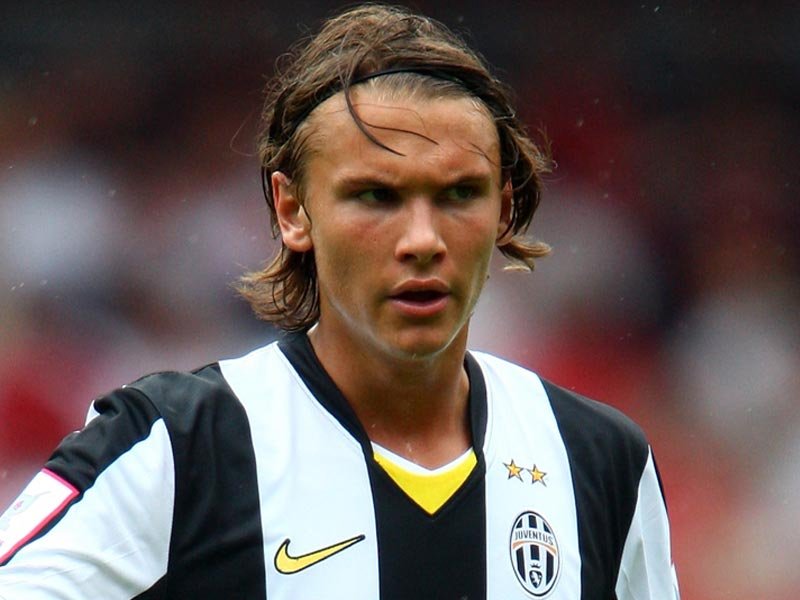← Back
Albin Ekdal, Football Player
Interview, 20 December 2018
With his cultured manner and the looks of the ideal son-in-law, this soft spoken and well-articulated young man comes off as anything but a top athlete. But looking past appearances in the case of Albin Ekdal will tell you a different story.

At the age of 17, Ekdal left his friends, family and comfort zone of a quiet suburban area of Stockholm and signed with Italian super club Juventus, having risen through the ranks of Swedish football consistently throughout his youth.
This year, having played an integral part in Sweden’s successful World Cup campaign in Russia, the midfielder returned to Italy where he joined Genoa based club Sampdoria. His fifth club in Italy’s top flight following a three-year stint at German club Hamburg.
With 42 appearances for his country and years of experience from some of the most challenging leagues in Europe, Ekdal is now back in the country he considers his second home along with his girlfriend and their newly born daughter.
We were curious to hear what enables an athlete to succeed and what life is actually like as a professional football player in the modern age.
To find out, we had to hear from a first-hand source.
We caught up with Albin Ekdal for a conversation about living the ultimate boy dream, what sacrifices must be made in order to get there – and why it might be a good idea to stay inside the house after a loss in the football crazed nation of Italy.
You had a reputation in Sweden for being one of the country’s brightest talents when you signed with Italian giants Juventus at age 17. Can you describe the feeling of being involved in something like that at such a young age?
– I was aware of the interest shown by Juventus around six months prior to actually signing with the club. Once the deal was done it was surreal to think I was joining one of the biggest organizations in the world and I was experiencing powerful feelings of pride and excitement. At the same time, it was slightly terrifying to leave my home, family

Most people agree that athletes who make it to the highest level are born with an extraordinary winning mentality. How strong is your desire to win?
– I’ve always had a very strong will to win, at any cost. In the playground at school or playing with friends and of course in real games. But I would say the stronger factor is how much I hate to lose. I’m an extremely sore loser. That fear is stronger than the will to win so I have always fought extra hard in training to avoid losing. My dad has shown me clips of when I was little and how I was inconsolable and furious after losing, which perhaps is a little embarrassing looking back on it. But I guess that’s the mentality you need to have in order to make it in this sport.
Apart from a strong winning mentality, what do you feel is the most crucial factor that determines whether an athlete succeeds or doesn’t make it all the way?
– A prerequisite for success as a footballer is of course talent, but I would say the mental part is equally crucial, if not more. To have the desire to always get better and the will to make progress is super important. Not being satisfied in times when things are on the up-and-up is also key. Being around 15 or 16 years old, a lot of players around me had the same amount of talent as me but for some
“You have to be mindful of the fact that if you aren’t doing your job, someone else will step in your place and do it.”


What do you feel is the biggest sacrifice you’ve made in order to make it all the way to the top flight of world football?
– Many sacrifices for sure. I left my family and my home a week after graduating high school to move to another country and over the years I’ve missed out on numerous trips and parties with friends and living that life of a carefree teenager. Since I have been living abroad on my own for so long I rarely get to see my family and that is of course a huge sacrifice. On the other hand, the life I lead is something most people my age only dream of so I am extremely fortunate to be doing what I do.
Your father, Lennart Ekdal, is a respected Swedish journalist and growing up in an academic home must have differed from many other young football players. What would you have become if not a professional footballer?
– Good question. Since I was very young, the teams I played in were among the best in the country so there was never really any doubt for me personally that I was going to play football for a living. The only question was how far I could go. But if I had to guess I would say that I would maybe have ended up in the same field as my dad, meaning within media or journalism. I think that would have suited me quite well.
After three years in the German Bundesliga you moved back to Italy in the summer, joining Sampdoria from Genoa. How does it feel being back in such a familiar environment?
– It feels really good. It was my wish, along with my girlfriend, to return to Italy where we know the way of life and the way football works. If you move to a new country and a new culture of football it can take several months to get used to everything, so coming “home” really makes everything a lot easier. We just had our daughter in October too so we thought it would be ideal for her to grow up in the country we both love and feel comfortable in.
Professional footballers in Italy are almost God-like figures in the eyes of the public; why are Italians so passionate about football and how does their passion affect you personally?
– First and foremost you have to understand that football is by far the biggest sport in Italy. The national team has always been regarded as one of the best in the world and everyone is emotionally involved. It’s not just an average male between the age of 15 and 50 who loves football, the culture of the sport is deeply ingrained in the fabric of society here, so of
“Italians are very passionate about their football and that is both good and bad. If the team is doing well you are regarded as a hero, but if the team is underachieving it might be a good idea to stay inside until you are able to turn things around…”

After a few years of falling behind other leagues in Europe, the Italian Serie A has seen a resurgence in recent years. How do you rate Italian football at the moment?
– I would say Italian football is in a fairly solid state. Given the economic turmoil in the country of late and that things aren’t always running as smoothly as you’d like – it’s very hard to compete with the English Premier League for example. The economic situation in England is on another level when it comes to television revenue, stadiums and club wealth. But in terms of football, the Serie A is among the four best leagues in the world if you ask me. Not to mention that it’s such an amazing place to live and play.
How do you prepare for life after your playing career?
– I think it’s sound to start thinking about that stuff early on because there will come a day when you no longer have a strict weekly schedule. Going to the training ground every day and playing games on the weekends. A lot of players become lost after they hang their boots up because it’s not easy to suddenly have nothing to do in your mid-30s. I have a few ideas of what I want to do but haven’t decided on anything specific yet. It’s still a few years away for me.